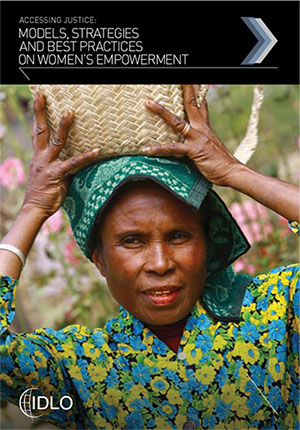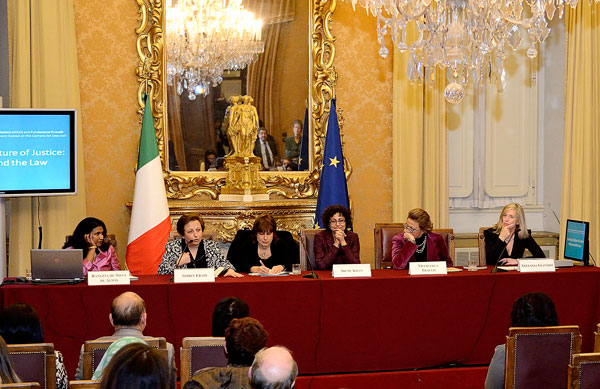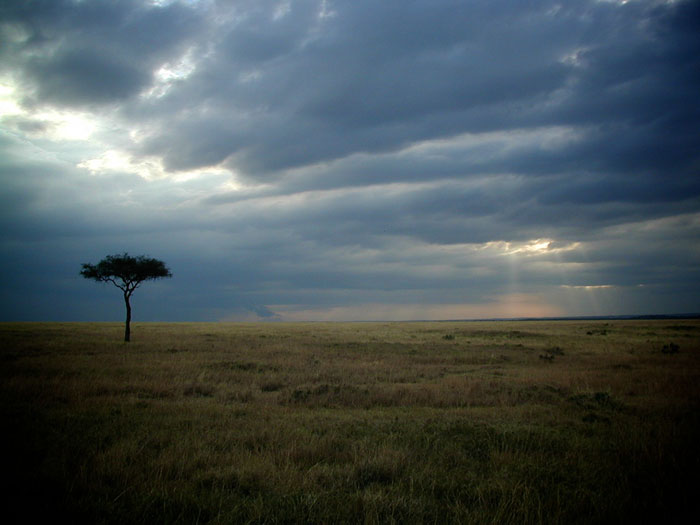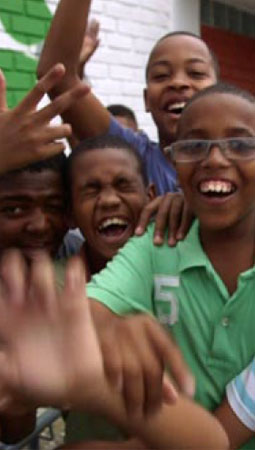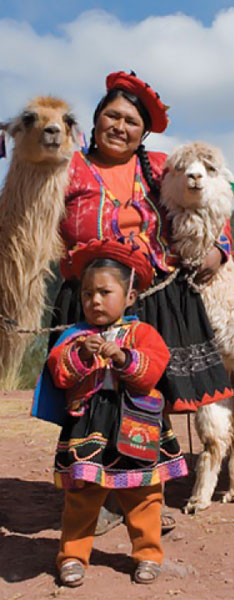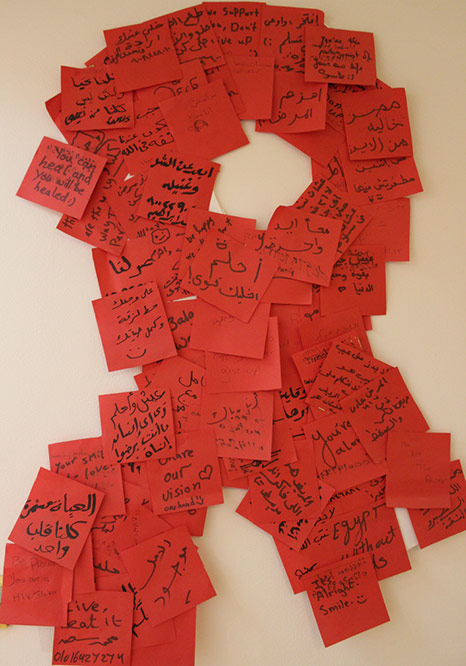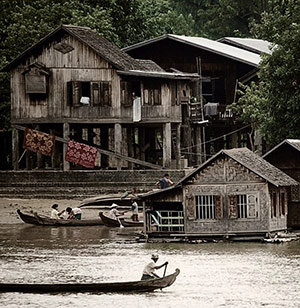ACCESS TO JUSTICE
WOMEN'S ACCESS TO JUSTICE
IDLO recognizes that the international community has made substantial investments in strengthening the rule of law and women's rights. Despite these efforts, justice eludes many women and girls around the world.
In 2013, IDLO launched a research and advocacy program to improve women's access to justice. Drawing on our experience and that of our partners, we published a report reviewing case studies from eight countries: Afghanistan, India, Mozambique, Namibia, Rwanda, Tanzania, Papua New Guinea and the Solomon Islands.
In Accessing Justice: Models, Strategies and Best Practices on Women's Empowerment, we argue that women's empowerment is fundamental in creating a culture of justice.
The report recommends engaging creatively with both formal and informal justice systems to ensure they work for women rather than against them; making gender-justice initiatives sustainable through partnerships with civil society; and packaging legal aid delivery together with existing services frequently accessed by women, such as midwifery and microcredit schemes.
LEGAL EMPOWERMENT INCLUDES LEGAL EDUCATION; LEGAL AID SERVICES; SUPPORT FOR NON-DISCRIMINATORY DISPUTE-RESOLUTION FORA TO COMPLEMENT INFORMAL SYSTEMS; TRAINING FOR PARALEGALS; AND RIGHTS AWARENESS
JUSTICE FOR BANGLADESHI TEXTILE WORKERS
Over a lifetime of advocacy, I have seen the discourse about human rights fragment and diversify as societies and communities gain in complexity. Political rights. Women's rights. Labor rights. This sectorial approach may help to mobilize constituencies. But it fails to reflect the way rights shade into each other, feed off one another, rise and fall together.
In Bangladesh, the connections are stark: labor rights are linked to women's rights, women's rights to freedom of religion, freedom of religion to freedom of conscience to freedom of speech. The freedom of bloggers to say what they wish. The freedom of women – and men - to work without fear of death. The right to a safe environment.
The Rana Plaza disaster and the outburst of Islamist violence are part of the same concatenation of ills, fed by corruption, political expediency and contempt for universal human rights. When only my rights count, not yours, no human right is safe.
Irene Khan
NEW YORK TIMES, May 2013
Image: IDLO | Click to see full-size image
SPOTLIGHT: WOMEN AT THE HEART OF POLICYMAKING
In November 2013, under the patronage of Italian parliamentary Speaker Laura Boldrini, IDLO convened women thought leaders and lawmakers at Rome's Palazzo Montecitorio. Joining Director-General Irene Khan to discuss 'Women and the Law' were Nobel Peace Laureate Shirin Ebadi, Senator Stefania Giannini (now Italy's Education Minister), Rangita da Silva de Alwis of the Global Women's Leadership Initiative at the Wilson Center, and Francesca Tracló of Italian thinktank Fondazione Rosselli.
"When you talk about peace, you must insist that there are women around the table, and when you have countries where women don't even have the right to drive, make sure you send 20 women ambassadors there," Dr. Ebadi urged diplomats and policymakers.
KENYA: WOMEN'S PUBLIC SERVICE PARTICIPATION
Many Kenyan women are severely discriminated against - most often (though not exclusively) in customary law settings. In this context, the gender equality provision in the Constitution of 2010 was an important step: it mandates that women form at least a third of government staff, at all levels and in every part of the country.
In 2013, IDLO began working with the Government of Kenya to implement this provision. Aside from the intrinsic goal of gender justice, it is hoped that a substantive female presence will embed a peace-seeking culture in the Kenyan administration.
We assisted the Ministry of Devolution and Planning in coordinating policy development, legislation and resource allocation. In order to build the capacity of government staff, we conducted gender-focused training of trainers within each Kenyan ministry. We also began compiling a national baseline on civil servants' gender balance, as well as tools for monitoring gender recruitment, promotion and dismissal trends.
Image: Flickr - Terhorstj | Click to see full-size image
FAMILIES KILL EACH OTHER. AND WOMEN END UP THE BIGGEST LOSERS – THEY GET NOTHINGHenry Kuria, Democracy and Governance Manager, Act Kenya
SUPPORT FOR VULNERABLE WOMEN IN CENTRAL AMERICA
Reyna has just reached Upala. She came by bus, having braved the long, tough walk to the boarding stop. Ana, a mother of eight, also steps in, balancing on her head the pastries she sells for a living. Then Johana arrives on a battered bicycle; she is giving up a day's wages as domestic help to take part in the workshop.
All three women are from neighboring Nicaragua. All have suffered abuse at the hands of their husbands, partners or employers back home. All have crossed the border to reach this legal center, opened in rural Costa Rica with IDLO support. The project involves an institutional coordination mechanism to improve access to justice for migrant women victims of violence. Reyna, Ana and Johana are three among many.
In Tegucigalpa, Honduras, the Centro de Atención y Protección de los Derechos de las Mujeres (CAPRODEM) fulfills much the same function – although here, the victims are nationals rather than migrants. CAPRODEM is the latest IDLO-supported, gender-focused legal aid facility to open in the region. Honduran President Juán Orlando Hernández attended the inaugural ceremony.
I WOULD LIKE TO EXPRESS OUR GRATITUDE AND FRATERNAL BEST WISHES. LET US CONTINUE TO WORK TOGETHER TOWARDS A BETTER LIFE FOR OUR HUMAN COMMUNITYAlejandro Ubau Hernández, Mayor of Upala, Costa Rica
Image: IDLO | Click to see full-size image
BRAZIL'S 'HOUSE OF RIGHTS'
Although it has made strides in reducing poverty in recent years, Brazil retains a high degree a social inequality, with a GINI coefficient above 50 points. IDLO has been working to empower the disadvantaged in the country within the framework of the European Union's EUROsociAL program for social cohesion. The Brasilia Regulations Regarding Access to Justice for Vulnerable People, adopted in 2008, serve as a basis for our interventions. In 2013, a Casa de Direitos (House of Rights) was inaugurated in Rio de Janeiro with IDLO support. The concept brings under one roof legal advice and other essential legal services, while promoting the human rights of historically disenfranchised communities.
Opened in one of Rio's most challenging favelas, Cidade de Deus, the Casa de Direitos is helping to bridge the gap between the public authorities and some of Brazil's most deprived citizens. The example is destined to be replicated around the country.
INTERCULTURAL JUSTICE IN PERU
Despite growing awareness of their rights, enshrined in the UN Declaration of 2007, many of the world's indigenous peoples remain threatened by poverty and marginalization. Their social indicators are almost universally low. Their life expectancy is shorter; the burden of unemployment and disease affects them disproportionately. Institutional processes, including legal systems, are rarely designed with them in mind.
In 2013, under the aegis of the EU's EUROsociAL program, IDLO partnered with Peru's Ministry of Justice and the judiciary to promote access to justice for indigenous communities in the district of San Martín.
The intervention sought to strengthen orientation services and legal aid, establishing a model for intercultural justice. The aim was not only to make indigenous people more aware of their rights and legal options, but also to improve the capacity of both indigenous leaders and legal personnel to address concerns of communal interest – specific cultural norms, linguistic barriers or land-related conflicts.
In the name of the Ministry of Justice, I would like to thank you for helping ensure the success of this important pilot program on intercultural justice. I consider this an excellent example of social and inter-institutional cooperationErnesto Lechuga Pino, Director, Defensoría Pública, Peruvian Ministry of Justice and Human Rights
Image: Flickr - Dave Austria | Click to see full-size image
AFGHANISTAN: LEGAL AID AND THE ELIMINATION OF VIOLENCE AGAINST WOMEN
As early as 2006, IDLO assisted graduates from its Defense Lawyers Training in launching a nationwide Afghan movement to promote access to justice and legal awareness, and to provide non-governmental legal aid to the poor. Ever since, we have supported and improved legal aid services through training, technical assistance, monitoring, evaluation and financial support.
By end-2013, more than 160 lawyers and support staff had provided legal aid, handling over 7,000 criminal and civil cases across Afghanistan. Many of those seeking aid have been female - often in harrowing situations. Throughout our engagement in Afghanistan, curbing violence against women has been a priority concern.
Although efforts to pass the Law on the Elimination of Violence Against Women (LEVAW) through the Afghan Parliament have stalled, a presidential decree allowed IDLO to use the bill's framework to sign a memorandum with the Attorney General's Office. This led to the creation of specialized units to prosecute cases of gender violence.
The first such unit was established in March 2010 in Kabul, with a second one following in Herat a year later. IDLO has since supported the opening of further EVAW Units in the provinces of Badakhshan, Balkh, Bamyan, Kapisa, Nangarhar and Parwan. More than 4,000 cases have been registered.
Separately, IDLO -supported Women's Protection Centers (WPCs) offer safety and support for victims of violence. In 2013, we mentored and upskilled WPC staff in ten Afghan provinces to improve service delivery and legal assistance.
Image: Andre Vornic | Click to see full-size image
MIDDLE EAST: JUSTICE FOR PEOPLE LIVING WITH HIV
IDLO's work on access to justice focuses on empowering the most vulnerable. Our recent record includes strengthening the legal response to HIV-AIDS in developing nations; fostering awareness of public health goals and human rights among police, judges and government officials; and building lawmakers' capacity for reform based on evidence, international law and best practice.
Developed in partnership with UNAIDS and UNDP, IDLO's Scaling up HIV Related Legal Services toolkit has been distributed around the world (in English, French, Spanish, Arabic, Chinese and Russian). Separately, IDLO has launched the world's first e-learning course on HIV Law and Policy.
In Egypt and the wider Middle East, people living with HIV are among the groups facing most discrimination. Due to the virus's assocation with stigmatized behaviors, such as sex between men and drug use, many are forced into the shadows, denied treatment, left at risk of abuse and imprisonment.
In 2013, IDLO worked with UNAIDS and local partners to help hundreds of people living with HIV to access health and legal services. As well as providing tangible benefits to individuals, we aim to help keep HIV prevalence low.
I learned that I was infected [with the virus] when my husband was detained and put in a hospital. Then my family heard I was living with HIV. I used to raise my sister's children and play with them. But when my sister learned about my HIV status, she put an end to it. Even the doctor who was following my pregnancy refused to treat me when she learned of my HIV status. Now I'm afraid my in-laws will take the baby away from me. That's why I need someone to help meWafa, aged 16, is a beneficiary of IDLO-sponsored legal services programs
MYANMAR: REDUCING VULNERABILITY
In mid-2013, IDLO began working in Myanmar with government representatives, legal professionals, civil society groups and international organizations to develop legal capacity and improve access to justice for stateless people.
The stateless are some of the most vunerable members of Myanmar's society: their lack of status makes it hard to guarantee their physical integrity. They struggle to access fundamental rights and freedoms, including freedom of movement, political rights, the right to an education and health care.
Image: Flickr - druidabruxux | Click to see full-size image


